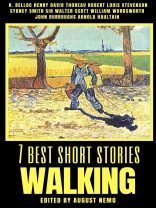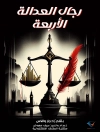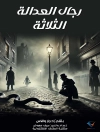Welcome to the book series 7 best short stories specials, selection dedicated to a special subject, featuring works by noteworthy authors. The texts were chosen based on their relevance, renown and interest.This edition is dedicated to walking. A common activity for man, walking can be a form of physical exercise, spiritual practice and philosophical tool. Being so universal, the habit of walking has certainly been addressed many times by literature – in this volume you will find seven examples of this relationship between literature and walking.This book contains the following texts: Walking, and the wild by Henry David Thoreau; Walking Tours by Robert Louis Stevenson; Walking an Antidote to City Poison by Sydney Smith; A Stout Pedestrian by Walter Scott; Lake Scenery by William Wordsworth; The Exhilarations of the Road by John Burroughs; Is Walking Selfish? by Arnold Haultain. If you appreciate good literature, be sure to check out the other Tacet Books titles!
O autorze
Joseph Hilaire Pierre René Belloc (27 July 1870 16 July 1953) was a British-French writer and historian and one of the most prolific writers in England during the early twentieth century. Belloc was also an orator, poet, sailor, satirist, writer of letters, soldier, and political activist.Henry David Thoreau (July 12, 1817 May 6, 1862) was an American naturalist, essayist, poet, and philosopher. A leading transcendentalist, he is best known for his book Walden, a reflection upon simple living in natural surroundings, and his essay 'Civil Disobedience’, an argument for disobedience to an unjust state. Thoreau’s books, articles, essays, journals, and poetry amount to more than 20 volumes.Robert Louis Stevenson (13 November 1850 3 December 1894) was a Scottish novelist, poet and travel writer, most noted for Treasure Island, Kidnapped, Strange Case of Dr Jekyll and Mr Hyde, and A Child’s Garden of Verses. A celebrity in his lifetime, Stevenson’s critical reputation has fluctuated since his death, though today his works are held in general acclaim. In 2018 he was ranked, just behind Charles Dickens, as the 26th-most-translated author in the world.Sydney Smith (3 June 1771 22 February 1845) was an English writer and Anglican cleric. Through his writings he perhaps did more than anyone else to change public opinion regarding Roman Catholic emancipation. Smith was also famous for his wit and charm.Sir Walter Scott (15 August 1771 21 September 1832) was a Scottish historical novelist, poet, playwright, and historian. Many of his works remain classics of both English-language literature and of Scottish literature. Famous titles include The Lady of the Lake and the novels Waverley, Old Mortality, Rob Roy, The Heart of Mid-Lothian, The Bride of Lammermoor, and Ivanhoe.William Wordsworth (7 April 1770 23 April 1850) was an English Romantic poet who, with Samuel Taylor Coleridge, helped to launch the Romantic Age in English literature with their joint publication Lyrical Ballads. Wordsworth’s magnum opus is generally considered to be The Prelude, a semi-autobiographical poem of his early years that he revised and expanded a number of times. John Burroughs (April 3, 1837 March 29, 1921) was an American naturalist and nature essayist, active in the U.S. conservation movement. The first of his essay collections was Wake-Robin in 1871. In the words of his biographer Edward Renehan, Burroughs’ special identity was less that of a scientific naturalist than that of 'a literary naturalist with a duty to record his own unique perceptions of the natural world.’Theodore Arnold Haultain (18571941) was a British writer. He was for many years secretary to Goldwin Smith in Toronto, writing a memoir and acting as literary executor after his death. His book, 'Hints for Lovers’, was a limited edition, dedicated to his daughter Emma.












